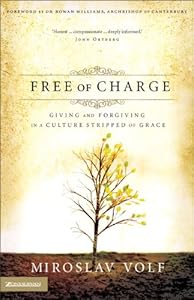Miroslav Volf on forgiveness
I'm reading Free of Charge: Giving and Forgiving in a culture stripped of grace by Miroslav Volf. I'm not done yet, but his chapter on "How should we forgive?" is magnificent. I am challenged and blessed by his understanding of the relationship of repentance to forgiveness. He sets us up, Cover via Amazon "Those who argue that we should repent before God forgives us usually also argue that offenders should repent before we grant them forgiveness." p. 180 I want to disagree with everything in this sentence. Doesn't Peter tell the crowd in Jerusalem to repent, Acts 2:38. On the other hand, I also understand our Lord's Prayer instructs us to forgive, regardless of the response of the offender.
Cover via Amazon "Those who argue that we should repent before God forgives us usually also argue that offenders should repent before we grant them forgiveness." p. 180 I want to disagree with everything in this sentence. Doesn't Peter tell the crowd in Jerusalem to repent, Acts 2:38. On the other hand, I also understand our Lord's Prayer instructs us to forgive, regardless of the response of the offender.
 Cover via Amazon "Those who argue that we should repent before God forgives us usually also argue that offenders should repent before we grant them forgiveness." p. 180 I want to disagree with everything in this sentence. Doesn't Peter tell the crowd in Jerusalem to repent, Acts 2:38. On the other hand, I also understand our Lord's Prayer instructs us to forgive, regardless of the response of the offender.
Cover via Amazon "Those who argue that we should repent before God forgives us usually also argue that offenders should repent before we grant them forgiveness." p. 180 I want to disagree with everything in this sentence. Doesn't Peter tell the crowd in Jerusalem to repent, Acts 2:38. On the other hand, I also understand our Lord's Prayer instructs us to forgive, regardless of the response of the offender. But Volf does not contradict Peter. Later he writes, "Without faith and repentance we are not forgiven - God having done the forgiving notwithstanding. God has given, but we haven't received. Forgiveness is stuck in the middle between the God who forgives and humans who don't receive." pp.182-183 At this point, this Lutheran sounds more like Arminius. But then comes his his great insight. "Instead of being a condition of forgiveness, however, repentance is its necessary consequence." p.183 There is so much freedom in that thesis.
He continues in unpacking this wild thought, "If they imitate the forgiving God, forgivers will keep forgiving, whether the offenders repent of not. Forgivers' forgiving is not conditioned by repentance. The offenders' being forgiven, however, is conditioned by repentance... Without repentance, the forgivers will keep forgiving but the offenders will remain unforgiven, in that they are untouched by that forgiveness. Why? Because they refuse to be forgiven." p. 183
He reaches back to Luther as he often does, "By refusing to acknowledge the wrongdoing, Luther rightly claimed that a transgressor himself 'has changed a forgivable sin into an unforgivable one.' So repentance is essential." p. 183
Volf makes me so uncomfortable by pointing out my means of refusing forgiveness. "We usually not only refuse to admit the wrongdoing and to accept guilt, but seem neither to detest the sin committed nor feel very sorry about it. Instead, we hide our sin behind multiple walls of denial, cover-up, mitigating explanations, and claims to comparative innocence." pp. 184-185 I am guilty as charged. I do all those things, yet I hate it so much when others do it to me. What a gracious God I worship with Volf.
I want to let Volf have the last word. "Forgiveness does not cause repentance, but it does help make repentance possible." p.186
But I have to let the Bible have the last word. Romans 5:8 But God demonstrates his own love for us in this: While we were still sinners, Christ died for us.



Comments
God is good
jpu